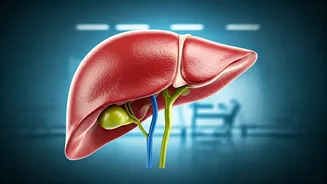Understanding Fatty Liver
Fatty liver disease, characterized by an excessive buildup of fat in the liver, is increasingly prevalent. It stems from various factors, including unhealthy
diets, alcohol consumption, and lack of exercise. This buildup can impede the liver's function, leading to inflammation and potentially cirrhosis. The disease often presents with subtle symptoms in its early stages, making early detection and intervention crucial. Fortunately, lifestyle modifications, particularly incorporating specific exercises, can play a significant role in managing and potentially reversing this condition. By adopting an active lifestyle and making conscious choices, individuals can protect and improve their liver health, thus mitigating the risks associated with this increasingly common health concern.
Cardio's Liver-Loving Benefits
Cardiovascular exercises, such as brisk walking, running, cycling, or swimming, are key to improving liver health. These activities boost the body's metabolic rate and promote fat burning, which reduces the amount of fat stored in the liver. Aim for at least 150 minutes of moderate-intensity cardio each week, spread over several sessions. This helps enhance insulin sensitivity, which is often compromised in fatty liver disease. Moreover, cardiovascular exercise improves blood circulation, contributing to better liver function. Consistent cardio routines also assist in weight management, a critical factor in mitigating the effects of fatty liver. Regular cardio exercises contribute substantially to overall well-being, reducing the risk factors associated with liver-related complications.
Strength Training's Role
Strength training, involving weightlifting or bodyweight exercises, is vital in managing and reversing fatty liver. It increases muscle mass, which in turn enhances metabolic rate and reduces fat storage. The building of muscle tissue encourages the body to utilize fat deposits, including those within the liver. Incorporate strength training sessions two to three times a week, targeting different muscle groups during each session. This can include exercises such as squats, push-ups, and lifting weights. Strength training also improves insulin sensitivity and reduces inflammation, both of which are central to the health of the liver. The benefits extend beyond the liver, bolstering overall metabolic health and reducing the risk of numerous lifestyle diseases. Consistent resistance training enhances overall physical fitness and contributes to a healthier lifestyle.
High-Intensity Interval Training
High-intensity interval training (HIIT) is highly effective for liver health improvement. HIIT involves short bursts of intense exercise followed by brief recovery periods. This training boosts the metabolic rate and efficiently burns fat, improving liver function. A typical HIIT workout might include alternating between 30 seconds of high-intensity activity, like sprinting or jumping jacks, and 30 seconds of rest. These workouts are time-efficient and can deliver remarkable results. HIIT exercises boost fat burning, thus reducing fat accumulation in the liver. Moreover, the dynamic nature of HIIT training increases insulin sensitivity. Regular participation in HIIT workouts provides a powerful boost to overall fitness, contributing to significant improvements in health and well-being. This workout regimen helps boost the body's ability to utilize energy efficiently.
Yoga's Liver-Boosting Poses
Yoga, particularly specific poses, can benefit liver health. Certain yoga poses gently massage the abdominal organs, enhancing blood flow and detoxification. Twisting poses, like the seated spinal twist, and forward folds are especially beneficial. These postures promote circulation and support the liver's natural detoxification processes. Regular yoga practice can also reduce stress and promote relaxation, which can benefit the liver. Incorporate yoga into your routine a few times each week, focusing on poses specifically designed to stimulate the liver and aid digestion. Yoga’s holistic approach to wellness includes improving flexibility, strength, and mental clarity, which contributes to overall well-being and a healthier lifestyle. The practice can provide significant benefits to those seeking to enhance their liver function and general health.





















